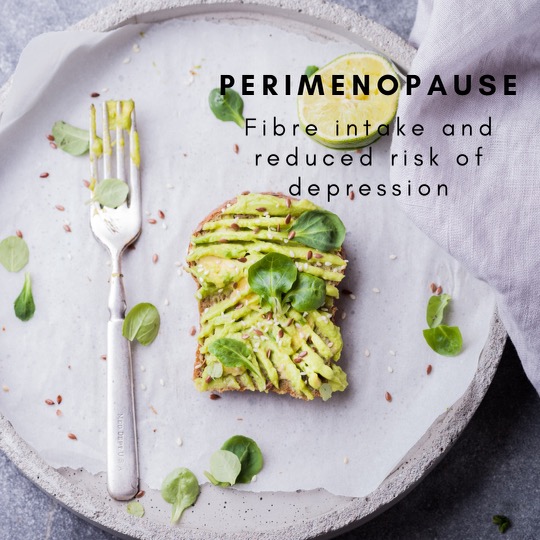By now, most of us know that gut health and mental health is intrinsically linked. There are a number of theories as to why this is the case, but one, which has been widely studied, is the impact of dietary fibre on gut health and in turn mental health.
In fact, a new study has analysed dietary fibre intake across 5,807 women (perimenopausal and menopausal) and the results showed, dietary fibre intake was higher in the non-depression group of perimenopausal women, compared to the depressed group. However, no significant differences were found for postmenopausal women.
Specifically, as little as an increase of 1 g fibre / 1,000 calories resulted in a 5% decrease in prevalence of depression among premenopausal women. This means if a typical woman eats 2,500 calories per day, an extra 2.5g fibre daily (= 1 kiwi fruit) can have a positive impact.
There are various reasons why perimenopausal women are at an increased risk of depression, but a key factor is the change in hormone levels.
It is believed, fibre improves the diversity of microbes in our gut, which directly affects neurotransmission, and more specifically, the production of serotonin our ‘feel good’ neurotransmitter.
The take home message of this study is that adequate fibre is a crucial aspect of a healthy diet. Additionally, fibre not only aids cardiovascular health, digestive health and weight management, but may also be an important tool to take care of mental health via the positive effects fibre has on our gut microbiome.
How much fibre do we need and where do we get it?
The Australian and New Zealand Nutrient Reference Values state 25g of dietary fibre per day is an adequate intake for all women aged 19 years onwards.
This is a good starting place and target to aim for. However, pushing this up slightly is an even better goal.
Please keep in mind, a sudden increase in fibre intake can result in gastrointestinal symptoms such as bloating, pain, increased bowel motions and diarrhoea, so it’s important to slowly increase your fibre intake overtime.
I have written about this before, but as a refresher, its important to remember not all fibre is the same, there are a few different types which have varying actions in the body:
Soluble fibre: slows down the digestive system, reduces raise in blood sugar levels and helps clear cholesterol. Food sources include chia and linseeds, oat bran, psyllium, green peas, vegetables and fruit.
Insoluble fibre: speeds up the bowels (good for constipation) and acts as a broom to sweep out the digestive tract. Food sources include rice bran, root vegetables, legumes, wholegrains and nuts/seeds.
Resistant starch: cannot be digested and goes straight to the colon to feed bacteria, useful for weight loss and overall gut health. Food sources include cooked and cooked pasta, rice and potatoes, green bananas, peas and cannellini beans.
Beta-Glucan is another important aspect of fibre; beta-glucan is a viscous fibre within foods (eg oats). The bacteria in our intestinal tract feed off the beta-glucan we consume and produces short-chain fatty acids and help to support the immune system.
Superstar sources of fibre
We all know that fruit, veggies, wholegrains, legumes, nuts/seeds are all good sources of fibre.
However, there are also some superstar sources, which can make hitting your daily target that little bit easier, including:
Linseeds: 1 tbsp. = 3.3g
Dried figs: 2 x figs = 4.3g
Orange: 1 large = 5.1g
Quinoa: 1 cup cooked = 5.2g
Pear: 1 medium = 5.5g
Chia seeds: 1 tbsp. = 5.6g
Corn: 1 medium cob = 5.6g
Parsnip: 1 large = 5.8g
Raspberries: 1 cup = 6g
Rye crisp breads: 4 x crisp breads = 6g
Oat bran: ¼ cup = 6.5g
Tofu: 100g firm = 6.5g
Broad beans: 1 cup = 7.7g
Sweet potato: 1 small raw = 11g
Edamame spaghetti: 100g = 14g
English spinach: 1 bunch = 14g
Cannellini beans: 1 cup cooked = 16g
Reference:
Kim et al, 2020 ‘Inverse association between dietary fibre intake and depression in premenopausal women: a nationwide population-based survey,’ Menopause, 28 (2).
